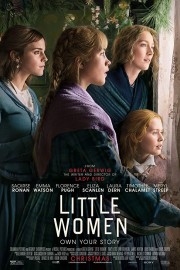Little Women
Greta Gerwig makes what might be the most self-indulgent decision in how she chooses to tell Louisa May Alcott’s beloved story, as well as the one that makes the most sense. Alcott based her story of the March sisters on the life she and her sisters lived with growing up. In her adaptation, Gerwig brings her own, personal perspective to the film, and the character of Jo, played here by Saoirse Ronan, a reunion between director and actor after 2017’s “Lady Bird.”
Jo has always been the main character of Alcott’s story, which follows the March girls- Jo, Meg, Amy and Beth- through the struggles they face with their mother (played by the wonderful Laura Dern) as their father is a preacher for the Union Army during the Civil War. For women living in poverty, or financial hardship, as they do, the best they can hope for is to marry a wealthy man to live the life they are raised to want, although only Meg (Emma Watson) seems to really want that life. Beth (Eliza Scanlen) is beset by Scarlet Fever, so she takes solace in her piano playing, and Amy (Florence Pugh) has the soul of an artist. Jo does not want to marry, and would rather make her own way in the world, as we see as she asks a publisher to look at a short story “her friend” has written. In a way, she almost wants the life and freedom of her aunt, Josephine (played by Meryl Streep), but when working as a writer begins to get difficult, and she has to take a teaching job, we empathize with her, and she might have a suitor-in-waiting in long-time family friend, “Laurie” Laurence (Timothy Chalamet), unless she finds herself too busy.
Gerwig eschews a traditional narrative structure in telling this story, which already separates it from other versions of Alcott’s story in movies, and it’s one that allows for past and present to show how these characters have changed- or not changed- and makes the big emotional beats of the story land more impactfully. There’s a moment where Jo takes Beth to a beach, which almost seems to run parallel to an earlier experience of all four girls at that same beach, but the tone is completely different. It can make for a difficult time trying to sort out the chronology of what is happening when, although cinematographer Yorick Le Saux’s lighting helps us differentiate, at times, as does Alexandre Desplat’s score. The craft behind this film is absolutely wonderful, and this is a very nice second film for Gerwig as a director (though I think “Lady Bird” is still better). She takes chances with structure and gets strong work out of every actor (Ronan, Pugh and Dern are the standouts) that make this film just fly by at over two hours. The film is exceptionally well paced, scenes flow in and out of one another, and there doesn’t seem to be any padding the narrative with scenes that don’t drive the emotional narrative Gerwig is looking to tell.
So, what was the “self-indulgent” choice that Gerwig made in this adaptation to “Little Women” that I brought up earlier? This film feels more about Jo individually than the sisters as a group, and yes, Jo has always been the main character, but the way Gerwig seems to put us so much within Jo’s perspective it unbalances the movie, at times. It’s obvious that she finds more personal identification in Jo than she does the other sisters, since Jo is a writer, and there are scenes between Jo and her publisher where Gerwig indulges herself in showing how the publishing world (which can be easily transplanted with the film industry) holds female writers to a different standard in order to publish their work, and also how out-of-touch old men are with the female perspective, and how Jo’s stories are not for old men like the publisher. Again, feels very self-indulgent on Gerwig’s part, but not only does it feel like a fitting way to recontextualize Alcott’s story for modern audiences than simply adapting it the same way it always has been, it also gives Gerwig a chance to show why this story is personal for her. That is valuable for a filmmaker to be able to do, especially with material as well-worn as Alcott’s story is, and even if it doesn’t help the movie as a whole, I can’t help but commend Gerwig for her choice here.










